Whereas it is expedient and necessary to establish an independent Anti-corruption Commission to prevent corruption and other corrupt practices in the country and to conduct inquiry and investigation for other specific offences and to enact other relevant matters; therefore, it is enacted as follows:
1. Short title, application and inception
(1) This law shall be called the Anti Corruption Commission Act, 2004,
(2) It shall be applicable to whole of the country.
(3) It shall be effective on the date determined by the government by official gazette notification.
2. Definitions
Unless there is anything contrary to the subject or context in this law –
(a) ‘Commission’ means the Anti-Corruption Commission established under section 3;
(b) ‘Commissioner’ means the Chairman or any other Commissioner of the Commission.
(c) ‘Chairman’ means the Chairman of the Commission.
(d) ‘Schedule’ means the schedule to this law
(e) ‘Corruption’ means the offences set out in the schedule to this law
(f) ‘Determined’ means determined by rules;
(g) “Code of Criminal Procedure” means the Code of Criminal Procedure, 1898(XV of 1898);
(h) “Selection Committee” means the Selection Committee constituted under section 7;
(i) “Bureau of Anti-Corruption” means the Bangladesh Bureau of Anti-Corruption constituted under the Anti-corruption Act, 1957 (XXVI of 1957);
(j) “Rules” means rules enacted under this law;
(k) “Secretary” means the Secretary of the commission appointed under section 16;
(l) “Special Judge” means a Special Judge appointed under section 3 of the Criminal Law Amendment Act, 1958 (XL of 1958).
3. Establishment of Commission, etc.
Prepared by International Business and Technical Consultants
(1) After this law has come into force, the government shall as soon as possible through an official gazette notification establish a commission named the Anti-Corruption Commission to meet the objectives of this law.
(2) This commission shall be independent and impartial.
Annotation:
An earlier version of the bill leading to this Act provided that the current Bureau of Anti- Corruption (“BAC”) would be dissolved when this Act came into force. The bill also provided that when the Act came into force, a selection process would begin, leading eventually to the appointment of the new Anti-Corruption Commission (“ACC”). The result of this was to create a vacuum during the selection period – the BAC would be dissolved but the ACC would not yet be established.
The bill was amended and the Act now provides under s. 35(1) (a) that the BAC stands dissolved when the Commission is established under s. 3. The drafters’ intention was to eliminate the vacuum. However, it is not perfectly clear what in law amounts to the establishment of the Commission under s. 3. Recommendation:
The Ministry of Law, Justice and Parliamentary Affairs (Mol) should be asked for an opinion in writing that in law the Commission is established under s. 3 when the Commissioners and the Chairman have been named by the President under ss.5 and 6 and gazette notification given under these sections.
At a later date, the Act should be amended to resolve any ambiguity.
4. Office of the Commission
The head office of the commission shall be in Dhaka and the commission, if it deems necessary, may establish a branch office at any place in the country.
5. Formation of the Commission, etc.
(1) The commission shall consist of three commissioners and the President shall appoint a chairman from among them.
(2) No action or proceeding of the commission shall be deemed illegal on the grounds of a vacancy in the position of any commissioner or any defect in constituting the commission nor shall this be questioned in a court of law.
Annotation: The intention of this section may have been to protect the Commission and its decision from challenges based on minor defects in the process of constituting the Commission.
However, the broad language of this section is open to the interpretation that the no person may challenge the constitution of the commission no matter how serious the defect. On the face of it, it would permit the Government to avoid the Selection Committee altogether or to appoint an unqualified person. It may be argued that judicial review would nonetheless be available to substantive defects. Prepared by International Business and Technical Consultants Recommendation:
Mol should be asked to provide an opinion in writing stating that this provision does not immunize the decisions of the Commission from substantive defects in the selection process.
At a later date, the Act should be amended to make it clear that this section applies only to procedural defects.
6. Appointment and tenure of the Commissioners
(1) The commissioners shall be appointed by the President on the recommendation of the Selection Committee constituted under section 7.
(2) The commissioners shall serve full time.
(3) Subject to the provisions of section 10, the commissioners shall hold office for a period of four years from the date of their appointment.
(4) The Commissioners shall not be eligible for re-appointment after the expiry of their tenure Annotation: Apart from resignation or removal for cause, the terms of all Commissioners will expire on the same date. The result is that every four years the Commission will have to make a new start with a new Chairman and a new set of Commissioners. The better practice would be for Government to make the initial appoints for periods of up to four years, so that Commissioners would depart one at a time. In this way, at any point in time there will experienced Commissioners.
In addition, there seems no reason why a good Commissioner should not be reappointed. In an ideal situation, some Commissioners would have the confidence of all stakeholders and their reappointment would be welcomed.
Recommendation: At a later date, the Act should be amended to provide that “the commissioners shall hold office for a period of up to four years from the date of their appointment; provided that the first appointments under this Act shall be for a period of four years for the Chairman and one of the Commissioners and for a period of two years for the third Commissioner”. Ss. 6(4) should be deleted.
7. Selection Committee
(1)In order to make recommendation for the appointment of commissioners, a Selection Committee of five members shall be constituted as follows,
(a) A Judge of the Appellate Division, nominated by the Chief Justice;
(b) A Judge of the High Court Division, nominated by the Chief Justice;
(c) The Comptroller and Auditor General of Bangladesh; Prepared by International Business and Technical Consultants
(d) The Chairman of the Public Service Commission; and
(e) The latest retired Cabinet Secretary.
Provided that, if the above-mentioned retired Cabinet Secretary is not available or declines the appointment, then the retired Cabinet Secretary who immediately preceded him shall be appointed.
It is further provided that, if the above-mentioned retired Cabinet Secretary is not available or declines the appointment, then the current Cabinet Secretary shall be appointed.
(2) The Judge of the Appellate Division nominated by the Chief Justice shall be the Chairman of the Selection Committee.
(3) The Cabinet Division shall provide necessary secretarial assistance to the Selection Committee.
(4) In order to make recommendations for the appointment of commissioners, the Selection Committee on the basis of the decision of at least three members present shall make a list of two names for each vacant post of commissioner and shall send the list to the President for appointment under section 6.
Annotation: It is not clear whether the President is to choose from two names for any given post or whether he can choose from the whole list. It is not clear why the President should be limited.
Recommendation: The section should be amended to make it clear that the President chooses from the whole list.
(5) The quorum of the Selection Committee shall be four (4) members.
Annotation: This section makes no provision for participation by civil society in the selection process. This may give the appearance of lack of neutrality in the appointment process. Recommendation: At a later stage, the Act should be amended to provide for the appointment to the Selection Committee of at least one qualified person from civil society.
8. Qualifications, disqualifications of the Commissioners, etc.
(1) Any person having at least 20 (twenty) years experience in law, education, administration, judiciary or a disciplined force shall be eligible for the post of commissioner.
(2) A person shall be disqualified for appointment as a Commissioner, if he –
(a) Is not a citizen of Bangladesh?
(b) Is declared or identified as a defaulter by any bank or financial institution. Prepared by International Business and Technical Consultants
(c) Is not relieved of the obligations under bankruptcy after he has been declared bankrupt by any court.
(d) Has been found guilty and convicted by a court of law on charges of moral turpitude or corruption.
(e) Is in government service.
(f) is unable to carry out duties of the commission due to physical or mental infirmity.
(g) Has received major punishment in a departmental case.
Annotation: It would be better for the section to state in positive terms the qualities that the Selection Committee should look for in candidates.
This section precludes from appointments many members of civil society. For example, persons whose experience is in science, engineering, business, journalism or the arts are all excluded. This will rule out many qualified candidates, some of whom might make. It makes it appear that the process is dominated by persons from the very groups the Commission is to investigate and make it harder for the Commission to establish credibility with civil society.
There is no provision for asset declarations for commissioners. It will damage their credibility in assessing whether others have assets in excess of known sources of income if their own position has not been assessed.
Recommendation: At a later stage, the Act should be amended to provide a positive statement of the qualifications of commissioners, for example: “Any person of excellent character, respected reputation and proven competence shall be eligible for the post of commissioner, provided that .
Permit the appointment of any qualified person provided he or she is not otherwise disqualified.
Provide for asset declarations in satisfactory form for all commissioners.
9. Non-eligibility of the Commissioners
At the end of his/her tenure, a commissioner shall not be eligible to hold any profitable office in the service of the Republic.
Annotation: The intention of this section was probably to reduce the risk of compromising the neutrality of Commissioners through improper promises of future employment. Read together with s. 8, its practical effect may be to implement indirectly an age restriction, since younger persons who are or might wish to be in the service of the republic will be discouraged from applying. A ‘cooling off period’ should suffice to deal with any improper incentives.
Recommendation: At a later stage, the Act should be amended to provide that “a commissioner shall not be eligible to hold any profitable office for a period of three years”.
Prepared by International Business and Technical Consultants
10. Resignation and removal of the Commissioners
(1) A Commissioner may resign from his/her office by giving one (1) month’s prior notice to the President.
Provided that commissioners other than the chairman shall send a copy of the resignation letter to the chairman for his information.
(2) Notwithstanding resignation under sub-section (1), the President may if necessary request the resigning commissioner to continue his/her duties until the formal acceptance of the resignation.
(3) No commissioner shall be removed from office except on similar grounds and in accordance with the similar procedures as apply to the removal of a judge of the Supreme Court.
Annotation: The provision will be difficult to administer if it is ever invoked. If the intention is to utilize the exact same grounds and procedures as are used for the contemplated removal of Supreme Court judges, it confuses judicial and executive processes and will require ad hoc adaptation of judicial council procedures. If what is contemplated are the ‘same kind of procedures’, it is not clear what procedures would meet that test.
Recommendation: At a later stage, the Act should be amended to provide that:
No commissioner may be removed from office except for just cause, including dishonesty, misconduct or gross negligence in the execution of his/her duties;
No commissioner may be removed only by reason of a decision made in good faith in the execution of his/her duties; and the decision should be made after due inquiry by an impartial panel of three persons appointed by the Selection Committee.
11. Temporary vacancy in the post of Commissioner
Subject to the provisions of this Act, if any commissioner dies, resigns or is removed from his/her post; the President shall within thirty days after the post has become vacant appoint a competent person to the post of commissioner.
Annotation: The Act does not clearly provide for the convening under s. 7 of a Selection Committee to make recommendations for new appointments.
Recommendation: At a later stage, the Act should be amended to provide that all appointments are made on the basis of recommendations made by a Selection Committee appointed under s. 7.
12. Chief Executive
(1) The chairman shall be the chief executive of the commission; and in case of his inability to perform his duties because of resignation, removal, absence, illness or any other reason, the Prepared by International Business and Technical Consultants President may ask any commissioner to assume temporarily the responsibilities of chairman.
(2) Other commissioners shall carry out the duties entrusted to them under the overall supervision and control of the chairman and the commissioners shall be accountable to the chairman.
Annotation: Some of the work of the Commissioners will be administrative in nature. In these matters, it is reasonable to provide that they act under the overall supervision and control of the chairman. However, other powers of the functions of Commissioners are quasi-judicial in their nature, for example, in making decisions as to whether to launch and inquiry or investigation, or to issue a warrant. In such matters, each Commissioner should make his/her own decision, with a majority rule where appropriate. This section is open to the interpretation that the Chairman could control such matters.
Recommendations: At a later stage, the Commission should make rules on how it will proceed in administrative and quasi-judicial matters. It should be made clear that each commissioner is independent in making quasi-judicial decisions under the Act. If necessary, a clarifying notification to that effect should be issued under s. 36.
13. Pay, allowances etc. of the Commissioners
The pay, allowances and other benefits of the chairman and commissioners shall be determined by the government.
Annotation: There should be special service rules for the commissioners to permit them to be compensated at rates that are competitive with the private sector. Otherwise, it will be impossible to attract good people except those who are already eligible for retirement. This has been done for WASA and other bodies.
Recommendation: After conducting a compensation review, the Government should enact special service rules to provide for compensation competitive with the public sector.
14. Meetings of the Commission
(1) Subject to the other provisions of this Act, the commission shall determine the procedures to be followed at its meetings.
(2) All meetings of the commission shall be held at the place and time determined by the chairman.
(3) The chairman shall preside over all the meetings, and in his/her absence, a commissioner nominated by the chairman shall preside over the meeting.
(4) The presence of two commissioners including the chairman will form the quorum of a meeting. Prepared by International Business and Technical Consultants
15. Decisions of the Commission
(1) All decisions of the commission shall be taken at its meetings
(2) The commission:
(a) For the purpose of discharging its responsibility shall make decisions and formulate recommendations regularly at its meetings.
(b) Shall regularly monitor whether the decisions and recommendations are being properly implemented; and
(c) Shall evaluate these in meetings of the commission every three (3) months.
Annotation: There is nothing in the Act to preclude the commissioners or other personnel from acting in matters in which they have a conflict of interest and duty.
Recommendation:
The Act should be amended to provide that no commissioner or other personnel shall take part in any inquiry, investigation or prosecution in which they have or appear to have a conflict of interest.
The commission should develop a detailed Code of Conduct identifying conflict of interest and other matters that may arise and providing commissioners and other personnel with guidance on how they are to be resolved.
16. Recruitment of the secretary, officers – employees etc. of the Commission
(1) There shall be a secretary who shall be appointed by the commission.
(2) The duties and responsibilities of the secretary, as directed by the chairman, shall be to prepare the agenda and proceedings of meetings, fix the date and time of meetings, keep a record of the actions of the commissioners, preserve relevant documents, and carry out other duties as directed by the commission.
(3) The commission may for the successful and efficient conduct of its work, appoint the necessary number of officers and personnel to carry out its work efficiently.
(4) The appointment and terms and conditions of the secretary and other personnel of the commission shall be determined by rules and until the formulation of such rules, the commission may, subject to the approval of government, determine these matters by administrative order.
17. Functions of the Commission
Prepared by International Business and Technical Consultants
The Commission may discharge any or all of the following functions:-
(a) Inquiry and investigation into the offences set out in the schedule.
(b) File and conduct cases under this Act on the basis of investigation and inquiry under clause (a).
(c) Inquire into any allegation of corruption on its own initiative, or upon an application filed by an aggrieved person or by any person on his/her behalf.
(d) Perform any duty entrusted to the commission by anti-corruption laws.
(e) Review the legally accepted measures for preventing corruption and submit recommendations to the President their effective implementation.
(f) Carry out research on the prevention of corruption and submit recommendations to the President regarding the actions to be taken on the basis of the research findings.
(g) Promote the values of honesty and integrity in order to prevent corruption and take measures to build up mass awareness against corruption.
(h) Arrange seminars, symposiums, workshops etc. on subjects falling within the jurisdiction of the commission.
(i) Identify the sources of different types of corruption existing in Bangladesh against the backdrop of the country’s socio-economic conditions and present to the President any recommendations for appropriate action.
(j) Inquire into corruption, investigate, file cases and determine the process of approval by the commission in respect of such inquiry, investigation and filing of cases.
(k) Perform any other work considered necessary for the prevention of corruption. Annotation: The manuals of procedure for the BAC have not been regularly consolidated and updated. In any case, they do no provide guidance on important policy matters that the Commission will now want to consider. In the matter of complaints, for example: how will complaints be received? By whom? How will they be screened and designated for rejection or investigation? In accordance with what criteria? In the matter of prosecutions, for example, what standard is to be applied to determine whether a case should be brought to court: all cases investigated? Only those showing a reasonable prospect of conviction? Only serious matters? Serious in what way? Effective performance of the commission’s functions depends on good delegation, which in turn depends on clear policy. Persons to whom authority is delegated need to have clear guidance in matters of policy and procedure they are to act appropriately.
Recommendation: The Commission should assign high priority to developing manuals of policy and procedure for its principal functions.
18. Exercise of Powers by the Commission
Subject to provisions of this law, any commissioners or any officer of the commissioner shall exercise such powers as and functions as may be assigned to him/her by the commission.
Annotation: The Act quite properly provides for delegation of responsibility. This will be an improvement over current practices in which delegation is more difficult and the handling of Prepared by International Business and Technical Consultants matters tends to be slow. As noted above, good delegation depends on the development of clear policies to guide the exercise of delegated powers. Delegations should be minimal at the outset, limited to more routine matters, while policies are being developed and staff is trained. Over time, more substantial delegations will be possible. In any case, delegations should be clearly recorded in a manual of procedure and updated from time to time.
Recommendation: Manuals of policy and procedure should deal with the delegation of authority.
19. Special powers of the Commission in respect of inquiry or investigation
(1) In respect of any inquiry or investigation into allegations of corruption the Commission shall have the following powers, namely: –
(a) Summons witnesses, ensure their appearance and interrogate them under oath.
(b) Discover and present any document.
(c) Take evidence under oath.
(d) Call for public records or its certified copies from any court office.
(e)Issue warrants for the interrogation of witnesses and the examination of documents.
(f)Any other matter required for realizing and fulfilling the aims and objectives of this law.
Annotation: This section makes no reference to the constitutional protections relating to self crimination the right to counsel. Nor does it refer to general penal law providing, for example, for cautions to persons accused of crimes. The exercise of these powers in violation of the constitutional provisions will be judged invalid.
Recommendation:
the Commission in its manuals of policy and procedure should make it clear that its powers can only properly be exercised in accordance with the constitutional protections and should clearly explain how that is to be done; for example, no person accused a crime should be interrogated under oath or induced to give The Commission’s training programs should qualify officers to act in accordance with the rights of accused persons and others.
(2) The commission may require any person to furnish information in matters relating to any inquiry or investigation and any person so directed is obliged to furnish information available to him.
Annotation: The Act makes no provision for the resolution of possible conflicts arising out of official secrets, legal and professional privilege or banking privilege. In what circumstances will documents so protected be subject to disclosure to the Commission? What protections will be provided to such documents when they are produced for examination by the Commission? Prepared by International Business and Technical Consultants Recommendation: The Commission should early on consider this matters and resolve as many issues as possible through its own rules and memoranda of understanding (for example, with the Government to provide for the release of classified documents and bank authorities in connection with accounts). Matters that cannot be resolved in this way may require amendment to legislation.
(3) Any person obstructing an official legally empowered by the commission or a commissioner in the exercise of his powers under this sub-section (1) or any person deliberately violating any order given under that sub-section commits a punishable offence is liable to a term of imprisonment of not more than three (3) years or a fine or both.
20. Power of Investigation
(1) Notwithstanding anything in the Code of Criminal Procedure, corruption shall be the subject matter of investigation by the commission alone.
(2) The commission may through an official gazette notification empower a subordinate officer of the commission the power to investigate corruption under sub-section (1).
(3) For the purpose of investigation into offences under this law, an officer empowered under subsection (2) shall have the power of an officer-in-charge of a police station.
(4) Besides the provisions of sub-sections (2) and (3), the commissioners shall also have the power to investigate any offence under this law.
21. Power of Arrest
Notwithstanding any other provision of this law, if any officer empowered by the commission has justifiable reasons to believe that a person in his/her name or in the name of others is the owner or in possession of moveable or immoveable property not compatible with known and declared sources of his/her income, then subject to the permission of the court the officer can arrest that person.
Annotation: The Act does not provide for the circumstances in which such a person can be arrested, for what purpose or the period of detention. As arrest is a grave step, there should be clarity on these issues.
Recommendation: The Commission should by rule clarify how this power of arrest is to be exercised.
22. Hearing of the Accused Person
If during the inquiry or investigation into allegations of corruption, the commission considers that it is necessary to hear any person involved in the allegations, then that person shall be given a reasonable opportunity to be heard.
23. Investigation on complaint
(1) During any inquiry or investigation into allegations of corruption, the commission may call for any information from the government or from any authority or organization under the government, Prepared by International Business and Technical Consultants and if such information is not received within the time provided, then the commission may at its own initiative inquire into and investigate the allegations.
(2)During any inquiry or investigation into allegations of corruption by the commission on its own initiative, the government or the concerned authority or organization under the government shall cooperate with the commission in the manner determined by ordinary or special orders of the commission.
24. Freedom [or ‘independence’] to perform duties
The commissioners shall be free to discharge their duties under this Act subject to its terms.
25. Financial freedom (or, ‘independence’)of the Commissioners
(1) The government shall allocate a certain sum in favor of the commission for expenditure. It shall not be necessary for the Commission to obtain any permission in advance from the government in order spend the allocated money.
(2) This section shall not be construed as limiting rights of the Comptroller and Auditor General under Article 128 of the Constitution.
26. Declaration of properties
(1) If the commission is satisfied on the basis of its own information and after necessary investigation that any person or any other person on his behalf is in possession or has obtained ownership of property not consistent with his legal sources of income then the commission through an order in writing shall ask that person to submit a statement of assets and liabilities in the manner determined by the commission and to furnish any other information mentioned in that order.
(2) If any person –
(a) After having received an order mention in sub-section (1) fails to submit the written statement or furnish the information accordingly or submits any written statement or provides any information that is false or baseless or there are sufficient grounds to doubt their veracity or
(b) Submits any book, account, record, declaration, return or any document under sub-section (1) or gives any statement that is false or baseless or there are sufficient grounds to doubt its veracity, then that person will be sentenced to a prison term of up to three (3) years or a fine or both.
27. Possession of Property in Excess of Known Sources of Income
(1) If there are sufficient and reasonable grounds to believe that a person in his/her own name or any other person on his/her behalf is in possession and has obtained ownership of moveable or immoveable property through dishonest means and the property is not consistent with the known Prepared by International Business and Technical Consultants sources of his/her income and if he/she fails to submit to the court during trial a satisfactory explanation for possessing that property, then that person shall be sentenced to a prison terms ranging from a minimum of three (3) years to a maximum of ten years imprisonment, and these properties shall be confiscated.
(2) If it is proved during the trial of charges under sub-section (1) that the accused person in his own name or any other person on his/her behalf has obtained ownership or is in possession of moveable or immoveable property not consistent with the known sources of his/her income then the court shall presume that the accused person is guilty of the charges and unless the person rebuts that presumption in court the punishment meted out on the basis of this presumption shall not be unlawful.
28. Judgment of the offences, etc.
(1) Notwithstanding any other law, offences under this Act shall be tried before a special judge.
(2) With the exception of subsections 6(5) and (6) thereof, the Criminal Law Amendment Act of 1958 (XL of 1958) shall apply to prosecutions and appeals under this Act.
(3) In the event of any inconsistency between this Act and the Criminal Law Amendment Act 1958 (XL of 1958), this Act shall prevail.
29. Annual Report
(1) By March of every calendar year, the commission shall submit to the President a report on its activities during the previous year.
(2) After having received the report under this section, the President shall take steps to present it in the Jamey Sang sad…
30. Organizational set-up, etc of the Commission
The organizational set-up of the commission and its budget shall be determined by the government
31. Indemnity for actions performed in good faith
If any person is affected or is likely to be affected by any action taken in good faith in the discharge of duties under this Act, then neither the commission nor any commissioner, officer or employee thereof shall be liable to action under civil or penal codes or otherwise.
32. Permission of the Commission for filing cases
(1) Notwithstanding anything in the Code of Criminal Procedure or any other law now existing, it shall be obligatory to obtain t





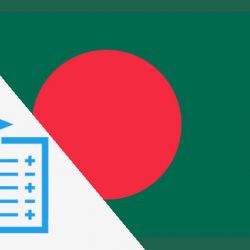
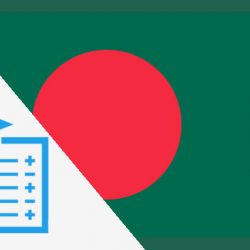
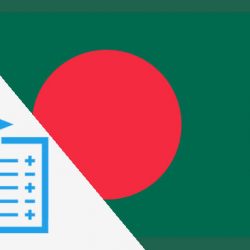
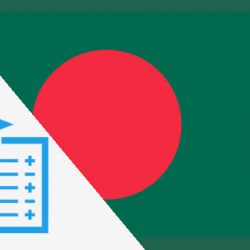
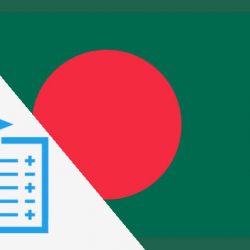

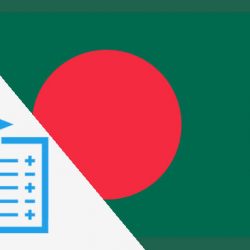
 We will not leak your personal information
We will not leak your personal information